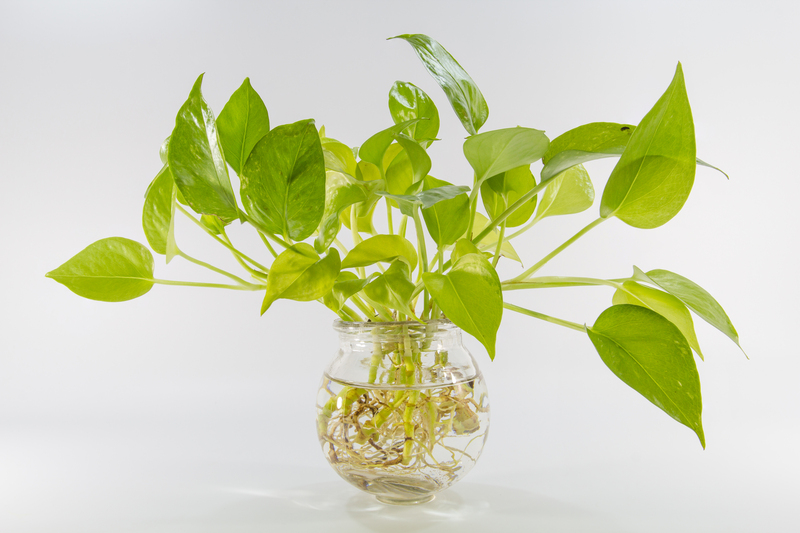Master the Art of Gardening with These 9 Essential Tips for Beginners
Posted on 20/06/2025

Master the Art of Gardening with These 9 Essential Tips for Beginners
Are you ready to transform your space into a lush, green paradise, but don't know where to start? Many beginners feel overwhelmed by the world of gardening, unsure of what to plant, how to nurture, or when to water. With the right guidance, you can confidently nurture your own thriving garden, enjoy the beauty of flourishing plants, and experience the calming rewards of cultivating nature. This comprehensive guide will introduce you to the most essential gardening tips for beginners, so you can master the art of growing your own oasis.
Why Start Gardening? The Life-Enhancing Benefits of Cultivating Nature
Gardening isn't just about growing vegetables or colorful blooms; it's about fostering a deeper connection with the earth and enjoying a multitude of perks:
- Mental Wellness: Studies show gardening reduces stress and boosts mood.
- Physical Activity: Digging, planting, and weeding all support a healthy and active lifestyle.
- Fresh, Homegrown Produce: Enjoy vegetables, herbs, and fruits straight from your own plot.
- Eco-Friendly Living: Growing your own plants reduces your carbon footprint and supports biodiversity.
9 Essential Gardening Tips for Beginners
Ready to master gardening? Here are the best beginner garden tips that will help ensure success and satisfaction in your blossoming journey.
1. Choose the Right Location for Your Garden
Selecting the perfect spot is a crucial first step in beginner gardening. Most vegetables and flowers need at least six hours of direct sunlight daily. Pick a location that is:
- Accessible: Easy to reach for daily care
- Safe from pets and wildlife: Protect young plants from being trampled or eaten
- Close to a water source for convenience
2. Invest in Quality Soil
The foundation of any thriving garden lies in its soil. Healthy, nutrient-rich soil promotes strong root growth and vibrant plants. Here's how to optimize your dirt:
- Test your soil's pH and nutrient levels (test kits are available at garden centers)
- Enrich with organic matter like compost, aged manure, or leaf mold
- Ensure good drainage to prevent root rot
3. Select Easy-to-Grow Plants for Beginners
For your first garden, set yourself up for success by choosing plants that suit your skill level and climate. Consider these easy options:
- Herbs: Basil, mint, parsley, and chives grow quickly and don't need much attention.
- Leafy Greens: Lettuce, spinach, and kale are resilient and harvestable over time.
- Flowers: Sunflowers, marigolds, and zinnias bloom with minimal maintenance.
- Succulent plants and cacti are perfect for indoor beginners with little time to water.
4. Develop Smart Watering Habits
Overwatering and underwatering are two of the most common mistakes in beginner gardening. Keep in mind:
- Water deeply, but less frequently, to encourage strong root systems.
- Water early in the morning to reduce evaporation and prevent disease.
- Check soil moisture before watering--if it's moist two inches down, hold off.
5. Feed Your Plants Right
Just as people need a balanced diet, your garden plants require essential nutrients:
- Use an all-purpose, slow-release organic fertilizer for most beginners.
- Compost adds both macro- and micronutrients as well as beneficial microbes.
- Follow package instructions to avoid over-fertilization, which can harm your plants.
6. Practice Mulching for Greater Success
Mulch is a gardener's secret weapon. Applying a layer around your plants offers multiple benefits:
- Retains soil moisture and reduces watering frequency
- Suppresses weeds, minimizing competition for nutrients
- Regulates soil temperature and adds organic matter as it breaks down
7. Learn Effective Pest and Disease Management
Every gardener faces challenges from pests and plant diseases. Stay ahead with these integrated pest management strategies:
- Inspect plants regularly for immature pests and disease symptoms.
- Remove affected leaves or hand-pick harmful bugs.
- Encourage natural predators like ladybugs and birds.
- Use organic solutions (such as neem oil or insecticidal soap) whenever possible.
8. Be Patient and Observe Your Garden Closely
Gardening is an art that involves observation, patience, and practice. Progress may be slow at first, but with time, plants respond to your care.
- Keep a garden journal or take photos to track growth and bloom times.
- Observe how different weather patterns affect your garden.
- Adjust your care routine based on your plants' response.
9. Continue Learning and Connect with Other Gardeners
The world of horticulture is vast and always offering something new to learn--whether it's trying new planting techniques or exploring unique plant varieties. To deepen your gardening skills:
- Read reputable gardening books, blogs, and magazines.
- Join local community garden groups or online forums to share experiences and ask questions.
- Attend workshops or watch instructional videos for hands-on tips from experts.
Frequently Asked Questions: Master Gardening for Beginners
-
How do I know what plants are best for my region?
Check your USDA Hardiness Zone or consult with local nurseries for plants that suit your climate. Many seed packets also list suitable zones. -
What basic tools should a beginner gardener have?
At minimum: hand trowel, pruners, gloves, watering can, and a spade. As you gain experience, you can expand your toolkit. -
How often should I water my garden?
Most gardens need about 1 inch of water per week, but this depends on your plants, soil type, and weather. Always check the soil before watering. -
Can I garden indoors if I don't have yard space?
Absolutely! Container gardening, hydroponics, and even herb windowsill boxes are perfect for beginners with limited space.
Conclusion: Start Your Gardening Journey Today
Gardening is a rewarding journey--for the senses, the mind, and the planet. By following these 9 essential gardening tips for beginners, you're laying a solid foundation for growth and success. Remember, start with the basics, learn as you grow, and don't be afraid to experiment. With each seed you plant, you're nurturing both your garden and your own wellness.
Ready to master the art of gardening? With patience, curiosity, and these proven beginner tips, you'll soon be reaping the colorful and delicious rewards of your own flourishing sanctuary.

Latest Posts
Transforming Organic Waste into Nutrient-Rich Soil for Sustainability
Discover the secrets of planting a thriving herb garden
Discover Gardening's Role in Mitigating Climate Change



